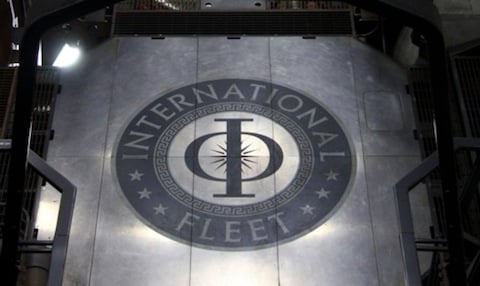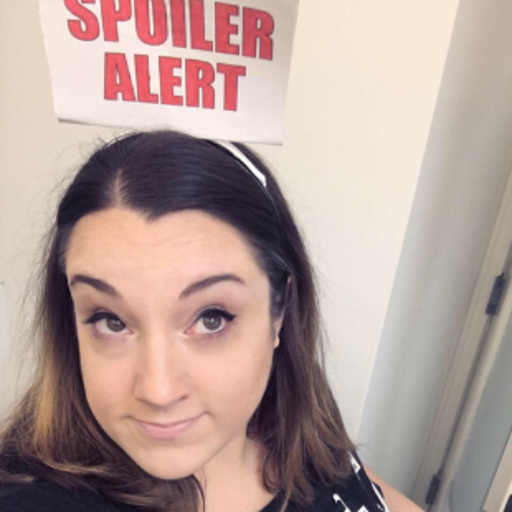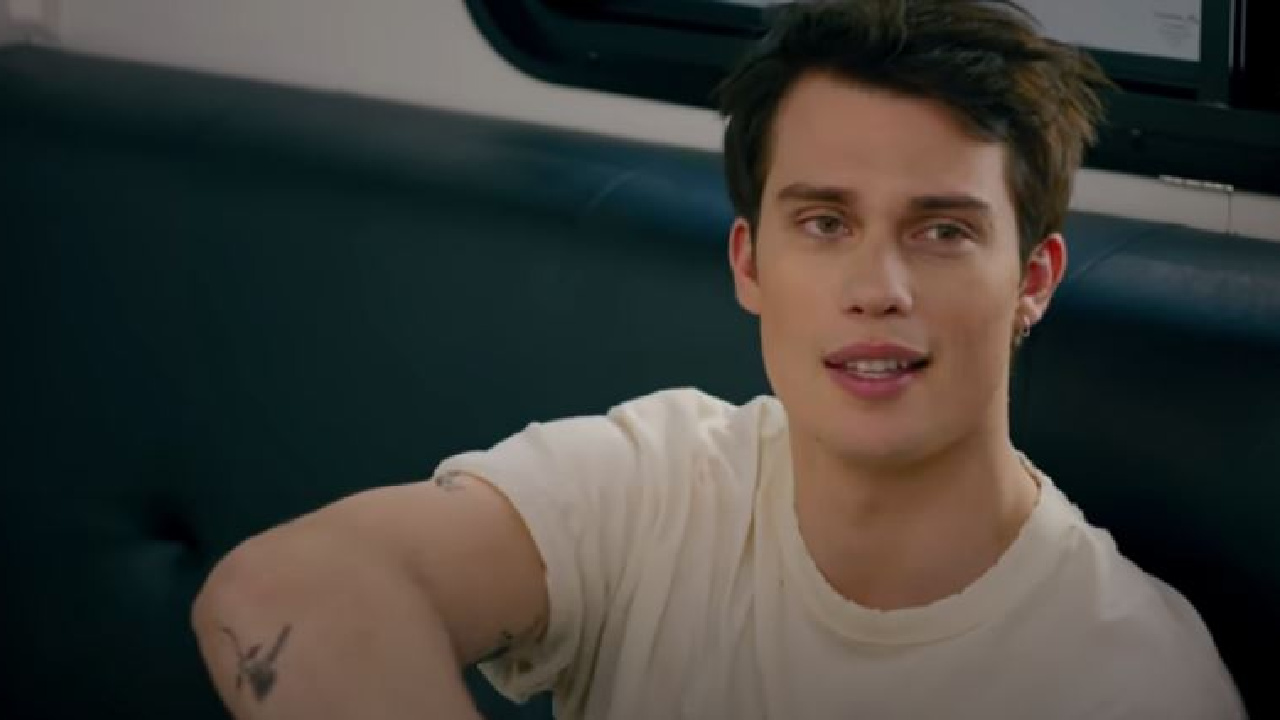More Ender's Game Fan Questions Answered And A Look At The International Fleet Seal

Last week, Ender's Game producer Roberto Orci took some time to answer a few fan questions about the feature adaptation of Orson Scott Card's sci-fi novel, which is currently in production. Among the topics of discussion were the fantasy "Mind" game played by the children training in Battle school, and Ender's relationship with Colonel Graff, among other tidbits. This week, Orci has answered a new set of fan questions on the Ender's Game production blog, and he's given us a look at the seal for the International Fleet.
In case you hadn't heard, Ender's Game is being made into a movie at long last! Asa Butterfield is set to play Ender, while Harrison Ford will play Colonel Graff. If you haven't read the book, the story is set in the future and follows a gifted child named Ender who is recruited by the military to attend a space-set Battle School to prepare for a war against an alien race referred to as the "Buggers." It's a great read, even for those whose interest in sci-fi is marginal. And, since we have until November 2013 to wait for the film, there's plenty of time to pick up the book.
Those of us who have read it have the Ender's Game production blog to satisfy our craving for updates on the film. I doubt I'm alone in hoping Mr. Orci continues these updates beyond the production for the movie, at least until we start to see some teasers.
Here's the photo for this week's blog entry…

There's definitely a military look to it, and the stars seem especially fitting.
Among the questions asked was how the film team would be "approaching the great deal of wonderful internal monologue." It becomes pretty clear in the book that Ender isn't a big talker. He's a thinker (and a really good one), and he also proves to be especially emotional and empathetic, which affects the choices he makes as a budding leader and among his peers. A big part of what makes the book so great isn't merely seeing what Ender does, it's understanding why he does it and how he makes his choices. Not all of that is expressed through dialogue, so this is a really good question. And Orci has a really good answer to go with it. It starts with a muppet…
We have a muppet of the Colonel who narrates the whole thing from the future. Oh, no wait, different movie. I joke because that is a great question and I think Gavin would tell you that it was the biggest challenge he faced in composing his script. It was also the most challenging aspect of the casting process. So here we have two things that really make it happen. First, we got such an unbelievable group of actors who can convey so much with their faces and body language… frankly, with their performances, which is something a book is denied using to convey inner emotion or thought.And secondly, of course, Gavin elegantly translated some of the inner thought into action or character decisions in his script — drama — and that allowed him to find natural places for the characters to speak about what they are going through.
Good actors and a good script. That sounds like part of the formula for any great movie, but it seems especially crucial when you consider how Ender reacts to things. Without getting into specifics for the sake of avoiding spoilers, I can think of a handful of moments in the book that, improperly adapted on screen, might come off completely wrong if we aren't made to understand why Ender reacts as he does. It's knowing Ender as Card allows us to through the narrative that makes the story work so well. Hopefully the film will find ways to translate all of that so that it comes together just as well in the movie.
Your Daily Blend of Entertainment News
That brings us to another question asked. This one focuses on empathy being used as a weapon. Ender's mindset isn't the only one we visit throughout the novel. We also get a general idea of how the fleet operates as it pertains to essentially manipulating these children in an effort to get the best and most out of them for the purposes of a war. While Orci doesn't specify any one aspect of the story in this answer, I can't help but think of that when reading his comment...
One of the great themes that is explored, in more ways than one, is how empathy can be seen as a weakness or a strength. How understanding an enemy makes you also understand their weaknesses. And even how withholding empathy can also be a weapon. The fact that the audience is going to want nothing more than for commanders to show these young people warmth and understanding, but that it has to be weighed against the fear of it being not in the young soldiers best interests in order for them to do what they have to do, makes for fascinating stuff.
The relationship between Graff and Ender comes to mind, especially when reading that last part. The novel gives us some understanding of Graff's feelings toward Ender and the calls he has to make when serving as a sort of guardian to the child. It's not just Ender's best interest he has to keep in mind, but also the fleet and mankind as a whole. It's interesting to see him trying to find that balance there, and it should be great to see how that comes through in the film, especially with Ford playing Graff.
Among the other topics of discussion on the blog is the compression of time. The book takes place over years, but from what Orci says, the time span within the film isn't as long. Also, Orci speaks highly of Aramis Knight, who's set to play Bean, another great character in the book. His story is further explored in much closer detail in Ender's Shadow, a novel that essentially tells Ender's Game from Bean's perspective. I'm still working my way through that, but from what I've read so far, Bean's a pretty fascinating character and we really only get a sample of that in Ender's Game, so it should be great to see how he's portrayed in the film.
And there's also a question about the military aspect of the story, which Orci answers by discussing the bootcamp the kids attended as part of their preparation for the film. Read all about it here. More information about the film can be found in our Blend Film Database.

Kelly put her life-long love of movies, TV and books to greater use when she joined CinemaBlend as a freelance TV news writer in 2006, and went on to serve as the site’s TV Editor before joining the staff full-time in 2011 and moving over to other roles at the site. At present, she’s an Assistant Managing Editor who spends much of her time brainstorming and editing features, analyzing site data, working with writers and editors on content planning and the workflow, and (of course) continuing to obsess over the best movies and TV shows (those that already exist, and the many on the way). She graduated from SUNY Cortland with BA in Communication Studies and a minor in Cinema Studies. When she isn't working, she's probably thinking about work, or reading (or listening to a book), and making sure her cats are living their absolute best feline lives.
